Content may contain affiliate links.
A Worldschooling curriculum is made up of the countries and places you take your children, plus any academic or informal study you choose to do. Daily life and simple tasks like reading maps, exchanging currency or booking a train are also part of a worldschooling curriculum. This post gives you ideas and examples of worldschooling curriculum. this was how we educated kids (and parents) from 6 years old to 18 years old, and for the rest of our lives
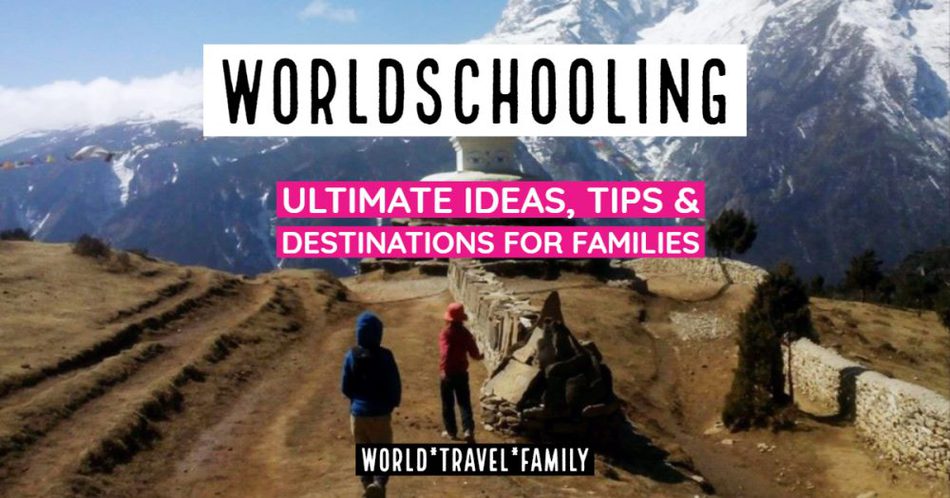
You’re here because you think travel is a great thing for your kids and you’ve heard of worldschooling and would like to try it. Right? I want to help because world schooling (worldschooling, global homeschooling, travel schooling, road schooling, nomadic homeschooling) has been my full-time job since 2012. We love learning as we travel and we want more people to try it. My boys are almost grown now, we have been a full-time digital nomad family and we’ve taken them to around 50 countries on all continents bar Antarctica to further their education. Before the travel adventure, we were regular stay-at-homeschoolers, the elder child went to school briefly, the younger one has never been.
Having tried school, homeschooling, unschooling, and worldschooling, I know which lifestyle I prefer and what works best for us.
If you, like us, think taking your kids to learn at source is a great way to do education, then here are our ultimate worldschooling ideas, tips and destinations.
Worldschooling has to start at home, there are tips for boosting pre-travel learning, and for worldschooling on the road.
Don’t forget, worldschooling or nomadic homeschooling is an active process, it’s not just taking the kids on holiday, you have to dig deeper, be interested, and do your research wherever you go.
Worldschooling Guide, Curriculum
Worldschooling necessitates long-term travel with kids and I wish I could write one definitive post called “How to Travel With Kids for Education” and answer all questions on the subject in 500 words, unfortunately, I can’t, nobody can.
I am the author of several books on worldschooling, they’re available to buy, but everything on our website is free. I’ve tried my best to give you the best information on worldschooling available, because we were a worldschooling family from 6 years old to 18 years old, right through school.
We now have, How to Travel the World as a section of this blog and everything you need should be there.
We’ve done it, financed it and enjoyed it, but to tell you how to do it would take a book because the options are endless. There is no one right way.
At the bottom of this post are some useful links attempting to cover that huge topic, just for you. If you have any questions on how to do this thing, put them in the comments. Thanks!
What is a Worldschooling Curriculum?
A worldschooling curriculum is made up off the places you visit, the cultures you explore, the foods you discover, the history you touch and the people you meet. Yes, it’s possible to string together a worldschooling curriculum.
Visit Egypt, Greece, Central and South America, Indo China, Australia and Rome – these places will be your classrooms. Their history and cultures will be your curriculum.
Further down the page we’ve given you a few ideas to put your itinerary together.
If you’re looking for a hard curriculum in the form of worksheets and text books – maybe look at online homeschooling programs. Be sure to keep it light and flexible. You can’t be tied to programs as you travel.
Worldschooling – Opportunities
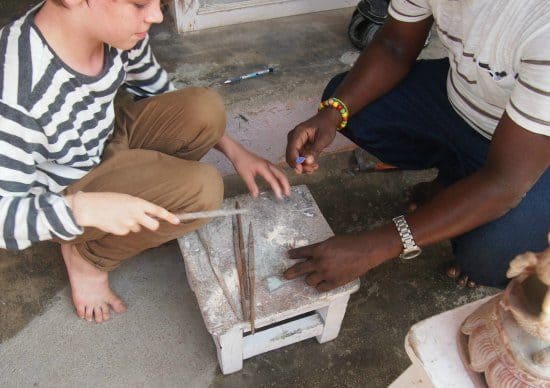
I think this is the most fun part of nomadic homeschooling or worldschooling, looking for opportunities for your kids.
Forget the conventional school-style curriculum for a moment and think about all the things your kids could be doing if they were in the perfect spot to try them with free time uncluttered by school or parents’ work schedule. Convention, offbeat and alternative pportunities our worldschooled children enjoyed have included:
- Cooking lessons in Cambodia, Thailand, Vietnam, India, Borneo, and Sri Lanka
- High diving lessons from World Champions at Crystal Palace, London
- Learning to kayak on calm, clear waters in Thailand
- Discovering their inner and physical strength, while map-reading and being immersed in physical geography, trekking in the Himalayas
- Becoming proficient at snorkeling and later, scuba diving, on the Great Barrier Reef and discovering that biome and its conservation issues.
- Volunteering. We volunteer picking up and categorising marine plastics. I’m sure you could find something to suit you.
- Learning to scuba dive. There’s a lot of physics there on top of marine biology, climates, and geography.
- Stone carving lessons from a master craftsman in India.
- Pottery Classes in Hoi An Vietnam
- Ski lessons, for weeks on end, in Romania
- Mastering climbing walls on 2 cruise ships
- Experiencing Forest School in London
- Learning the basics of languages through living them.
- Getting up-close with meerkats. A dream come true for my younger son at ZSL London Zoo.
I’m sure you could think of loads more experiences and places that would benefit your kids, you could find the ideal spot for learning horse riding, Thai boxing, circus skills, or surfing.
Likewise there must be some perfect place to learn basket weaving, paper-making, pottery, or painting. You can also find better, cheaper, more diverse and enjoyable activities for them to try or master by moving around the world.
Follow their interests, what would they like to try and what new experiences can you give them?
Don’t forget that by finding these opportunities they’ll be meeting passionate people with incredible skills. Those people are amazing and diverse mentors and really open kids’ eyes as to possibilities in life.
That’s real-world socialisation, the exact opposite of the institutionalised same-age socialisation of public schools.
Of course, you’ll also need to find opportunities for them to hang out with other kids sometimes, just for fun. We find that’s pretty easy, just take them anywhere kids gather.
Most playgrounds do the job or get them signed up for any kid-focused groups or courses that they like the idea of. Don’t fall into the trap of thinking that kids have to be kept in large groups as they are in schools, from experience, my two often prefer to stay away from other kids or hang out with adults young or old.
They like to be friends with people they like, not necessarily people of the same age.
Worldschooling at Home
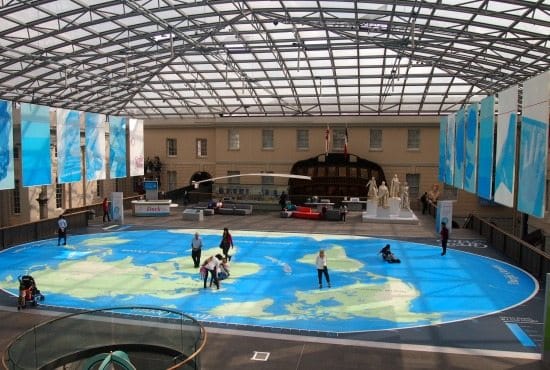
If you’re home-bound for a while, you can still learn a lot by stepping outside your front door, observing and asking questions. Don’t just take your corner of the world for granted, think about why it is that way.
- Visit every museum you can find. Give each one plenty of time and let the kids explore the areas that interest them. You can’t force learning. As they get older they will find more and more to interest them in museums. Trust me on that, don’t turn them off museums when they are too young by making them tedious. If they are old enough, kids’ audio guides are fantastic.
- Visit every historic building, monument, temple, gallery or UNESCO site. Find out as much as you can about them though books, videos and guides before you go.
- If the kids are old enough, take tours. In my experience there’s little point with small children
- Visit every type of environment in your area, shoreline, coniferous forest, deciduous forest, freshwater lakes, rainforests, swamps, wetlands, hills, and mountains. Get outside and see what grows there, what lives there and how those environments feel. Research before you go, read or watch videos and play treasure hunt, see what they can spot.
- Check out local agriculture and industry. What grows in your area? Why are particular animals raised? What manufacturing happens and where do the raw materials come from? Why do they do that here?
- How are houses constructed in your area, is that because it’s hot, cold, windy? Are locally available materials and traditions a factor?
- What do people eat? What is available and what are the staples? Why?
- What’s the weather like? Are there 4 noticeable seasons or just the wet and the dry? What are temperatures like? Why is that? Are you close to the equator, up a mountain, or at sea-level?
- What are the people like where you live? Are they all of one race and nationality, or do you have a glorious mixture? Why? Are they rich or poor? What is the predominant religion? How did that religion come to be there and what other religions can you find?
Just observe and ask questions. Be a learner. You’ll see that all the subjects that they study in neat boxes in school are actually tangled and intertwined.
Worldschooling on the Road
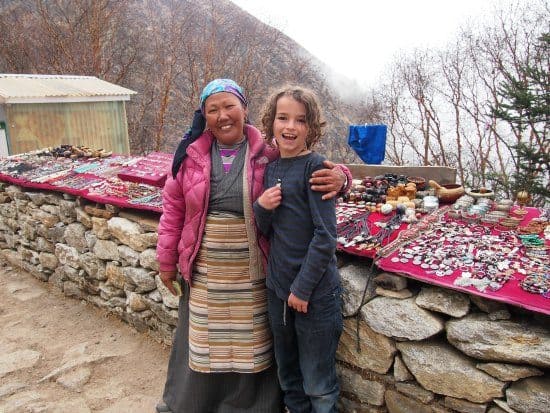
Once you leave the familiarity of home the things you observed above are going to change and because you noticed them and thought about them, you’ll see those changes more clearly and start to understand why things are so.
Just take all of the above and do them everywhere you go.
When you’re picking travel destinations for maximum educational impact, try to pick places with as much diversity as possible. So if you live in the tropics (as we did), go somewhere with snowy winters.
If you live in a busy city, find villages and countryside. If your kids never see the ocean, find a coral reef. This bit is so much fun, the world is a great big playground to explore, for you and for your kids.
There is so, so, much to learn everywhere in the world. Here are a few top pics on topics that can be explored in diverse ways through travel, just some ideas to get you thinking about the endless possibilities.
Worldschooling World Wars

As part of a worldschooling history curriculum, the World Wars are a very good topic to cover. Wars, my boys are always asking about them. Dad is the expert here, I’m not at all.
They’ve had in-depth conversations about events leading up to both world wars and how they ended, over dinner on four continents. They’ve also visited quite a few sites with war connections, from the shrapnel damaged buildings of Kensington, to Vietnam’s Cu Chi Tunnels the Bridge on the River Kwai in Kanchanaburi.
We’ve talked about poppies and their war association as we’ve seen them growing in abundance across Europe and strewn over the Tower of London in last year’s centenary.
We found the WW1 medicine exhibit at London’s Science Museum absolutely fascinating and recently we spent an incredible day visiting the Somme Battlefields.
I love that in worldschooling the same topics keep coming up time and time again, each place we visit adds another piece to the jigsaw and the kids’ knowledge deepens.
This audio book has been our constant companion around the world. We have the disc to play in cars and D has it copied onto his Nintendo 3DS to play over headphones. (Check prices and models on here).
Further reading ideas: The Boy in the Striped Pyjamas, The Diary of Anne Frank (Diary of a Young Girl), The Woeful Second World War (Horrible Histories).
Places to visit include, the Canberra War Memorial and Museum, Australia. Churchill’s War Rooms and the other Imperial War Museums in the UK. The Museum of London, Canary Wharf has a section devoted to WW2.
Worldschooling The Vietnam War
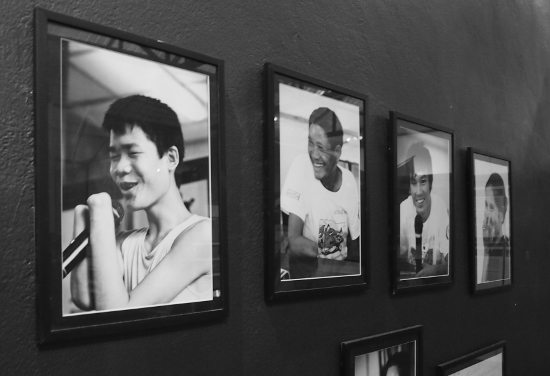
You absolutely have to go to Vietnam. Take them to the Cu Chi tunnels and the war museums. Think about age appropriateness here, the tunnels are fun, the museums can be harrowing.
In Laos, among the amputees and cluster bomb victims, they learned that the effects of this war continue today. Laos is the most heavily bombed country per capita in history, the US were trying to knock out the Ho Chi Minh trail. The kids have seen the devastation and the caves the Laos people hid in during the endless raids.
See this post on the COPE Visitor Centre in Laos, it’s brilliant, a must-visit.
Worldschooling Art & Great Artists
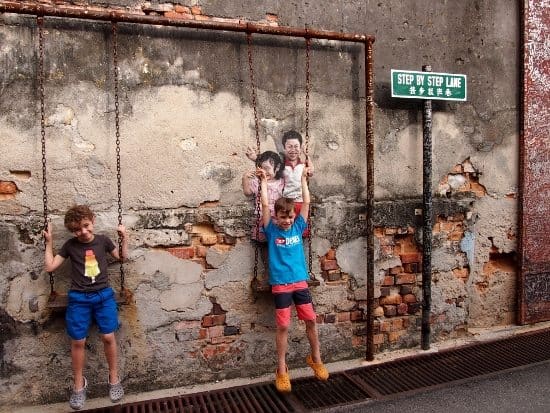
Great artists come from all over the world, back home in Australia we didn’t have an art museum of any kind to visit, so we checked out local artists and Aboriginal Art.
On the road you have way more opportunities, The Dali Museum in Spain, the Van Gogh Museum in Amsterdam, the Louvre in Paris, the free art museums in London, both the Tate Modern and National Gallery have kids’ audio tours.
Also check out the local, traditional art styles as you travel. Islamic art and calligraphy are fascinating and very different, learn why it is that way. London’s V&A has a good Islamic Art collection and the Museum of Islamic Art in Kuala Lumpur is superb. That one is better for older kids.
The boys first got interested in Van Gogh through Doctor Who, we’ve built on that interest over time through books, such as the colouring book below, and through seeing his works in galleries. If they didn’t know about Van Gogh BEFORE they saw his sunflowers, they would have been totally “Meh!” about just another painting.
Learning About Slavery
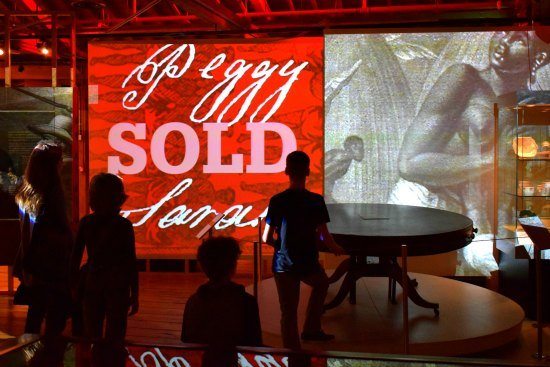
Slavery changed the world and it’s an important topic. We started learning about slavery back home in Australia when we were investigating the history and evolution of modern music (with lots of help from You Tube).
Since then we’ve visited the plantations of the deep south and seen the African influence in Charleston. In the last month, two museums have featured the slave trade as a topic, the Museum of London, above and the National Maritime Museum at Greenwich.
I hope to take the kids to West Africa soon, to see where the horror began. This part of history shouldn’t be glossed over.
Worldschooling Geography
Your worldschooling geography curriculum must include learning about earthquakes, volcanoes and fault lines. Many aspects of a normal geography curriculum are easy to learn through travel, particularly as children can observe real-world human impact of such events.
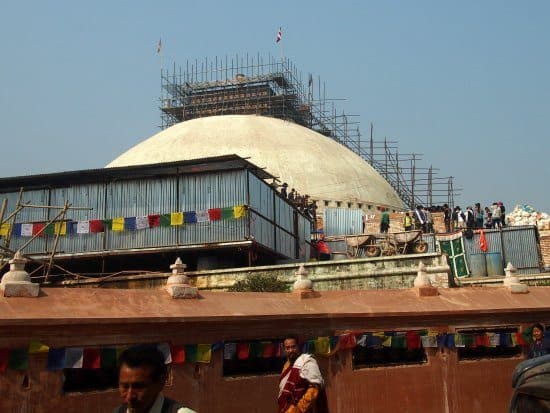
An unexpected “perk” of travel, the kids have now experienced half a dozen small earthquakes and tremors. Thankfully, nothing major. They know what it feels like.
They’ve also seen the damage that major quakes produce, in the streets of Kathmandu and in the landslides of the high Himalayas. They’ve seen human suffering.
Quake victims are no longer something unimaginable that exists on the other side of the world. When we see opulent spending these days, such as in the glitzy malls of Dubai, our thoughts are always with the Nepalese people still living under plastic sheeting.
The imbalance and lack of care in the world are something quite sickening.
They’re also familiar with what happened in Sri Lanka, the tsunami is an unavoidable topic over there. They’ve spent a lot of time with a British tsunami survivor and know how deeply affected he is by what happened that day and how incredibly lucky he and his 3 children were to survive.
In Guatemala we spent a month under a smoking volcano then another few weeks on a (hopefully) extinct crater lake.
What I’m trying to say is, that they know plate tectonics and about the associated natural disasters. They’ve stood on top of the world in the Himalayas and know that the ground was once sea bed and has been forced up into magnificent snow-capped peaks.
They’ve seen the fossil sea shells on sale in the streets in Kathmandu. It’s a topic we’ve covered, in depth.
When the boys did, eventually, start formal online schooling, (because of lockdown) these topics were exactly what was in their school geography lessons. They knew a lot more than the teacher.
London’s Natural History Museum has a great section on earthquakes, the planet’s structure and natural disasters, including a simulator and tsunami footage.
Read: National Geographic Kids Everything Volcanoes and Earthquakes.
Worldschooling Ancient Greece
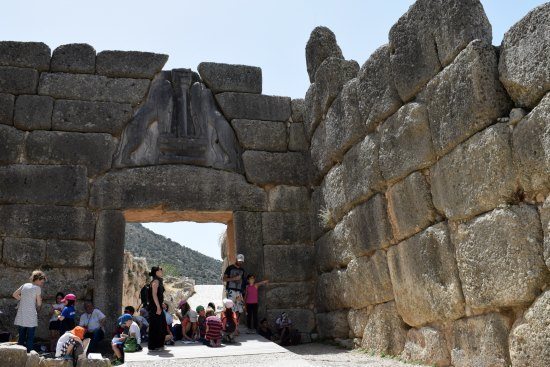
A history or classical worldschooling curriculum must include Ancient Greece, Rome and the Roman Empire, Ancient Egypt, at whichever ancient civilizations interest you and your kids. This is for many kids, the most interesting part of history.
We just took a tour of mainland Greece with history and mythology in mind. This was requested by my 12-year-old, he has a deep fascination born of his own reading, click through to find out more about that topic.
Worldschooling The Romans
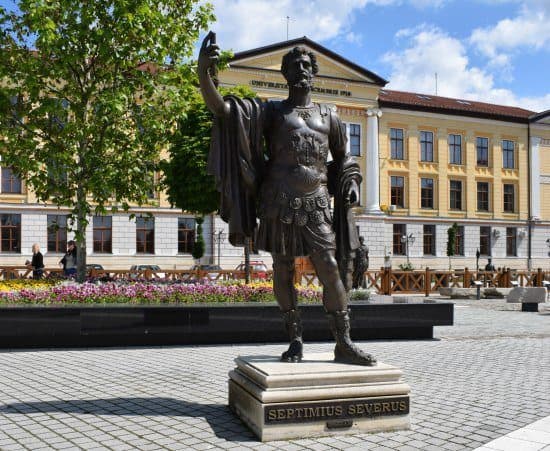
You’ll find their footsteps in every country touched by their empire. I think our most interesting encounters with the Romans have been at home in Romania, the Romanians are very proud of their ancestry and the language shows their influence very clearly.
We keep bumping into the same Emperors over and over again, in statues and in their works. The extent of Roman influence on the world is quite staggering, something I didn’t realise until we started this journey.
Later we took a trip to Jordan in The Middle East and were blown away by the incredible Roman cities and amphitheatres there.
Worldschooling World Religions
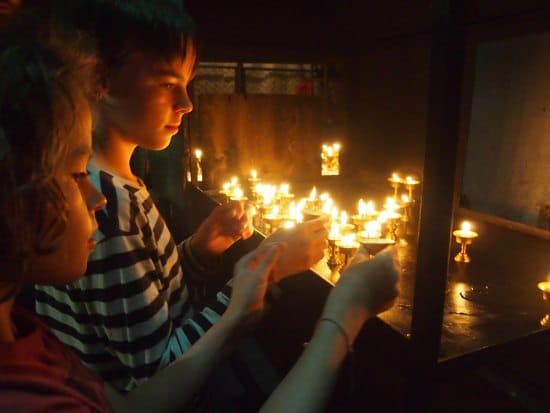
A worldschooling religious studies curriculum is possibly the easiest to put together.
These children of mine have visited temples and churches from every major faith and some very minor ones. They’ve lit candles to Ganesh, Bhairab, Jesus, and Shiva, they’ve visited mosques with mum respectfully covered by a hijab, they’ve sat and chatted with Saddhus in Kathmandu, they’ve hung out with the Amish in Pennsylvania, watched the incredible Easter processions in Guatemala, seen the grave of a Voodoo queen and been blessed by a Buddhist monk on top of a mountain in Cambodia.
Beat that, school RE lessons!
The wonderful thing about visiting these places is that people always want to share, they encourage the kids to get involved and will tell you a little about what is going on.
You, the parent,guardian, or worldschooling facilitator will probably need to do some extra research on world faiths too.
There was a wonderful TV series called Around the World in 80 Faiths presented by a British Christian minister. If you can find it on YouTube it’s a perfect, entertaining, introduction for older kids.
Next on our list has to be the Golden Temple in Amritsar, India, the holiest of places for Sikhs. It would also be cool to take them to the Vatican and, of course, to Israel.
Worldschooling Rainforests
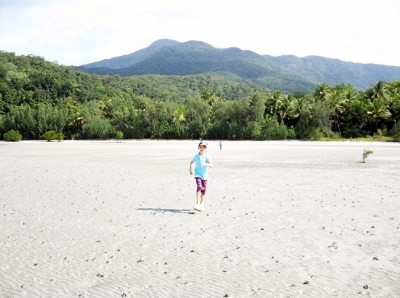
The average European kid will never see a tropical rainforest. They may learn about the forest floor, understory, canopy, and emergents, why the forest is structured that way, and what creatures inhabit each layer, but to actually see one and feel the himidity…wow!
There are temperate rainforests too, we encountered these in Guatemala, they’re quite different and it’s interesting to compare.
Visiting after doing some research is a great thing to do, or you can find guided walks or rainforest centres with exhibits and interactive displays to help your family learn about these ancient biomes.
We can highly recommend the Daintree Rainforest Discovery Centre and Canopy Walk in tropical Queensland.
Learning About The Spice Trade
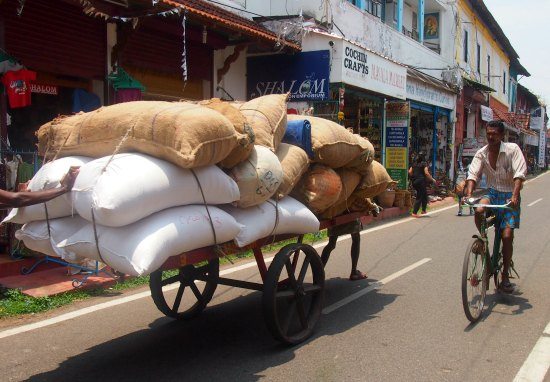
Malaka, India, London, the spice trade seems to follow us around. They’ve visited the museums, been on the ships, smelt the spices and seen them growing. It’s unavoidable and a valuable part of a worldschooling history curriculum.
Learning About Space Exploration
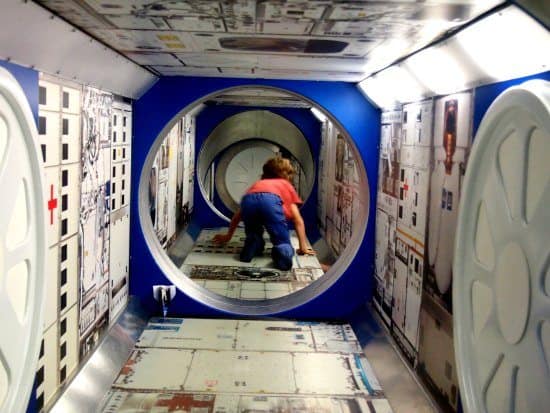
Nothing beats Kennedy Space Center, but London’s Science Museum has a good space section too, and is free.
The Smithsonian Air and Space Museum in Washington DC is a stunner and don’t forget to check out the space section at Epcot, Disney. Walt loved to educate and kids can learn a lot in his parks.
Read: There’s No Place Like Space. Cat in the Hat Learning Library. This book is awesome, we own it. It’s the best way to learn the planets in our solar syatem.
Worldschooling Biology and Natural History
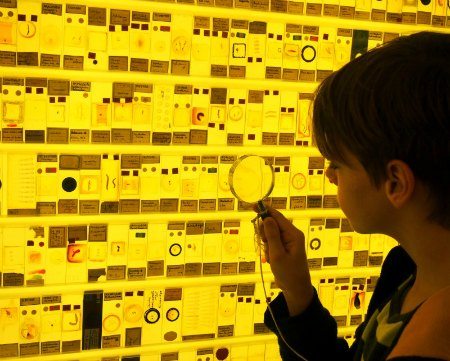
This is my subject, I was a Biologist and Zoologist in my life before websites. The two best and biggest museums for this have to be London’s Natural History Museum (free) and New York’s Museum of Natural History, just off Central Park.
Both are superb but quite different, it’s well worth visiting both. Try to find opportunities to get hands-on, many museums have exhibits for kids to touch and explainers nearby to fill in knowledge gaps.
Wherever you go you’ll discover the local flora and fauna and get a chance to consider adaptation to environment at source, look out for nature parks showcasing the local environment, zoos (London Zoo is our absolute favourite) A few more ideas on places to visit below:
The Grant Museum of Zoology, London. Free.
Welney Wetland Centre, Norfolk. UK. Just one example, there are thousands of similar places.
Australian Wildlife Parks such as the Rainforest Habitat in Port Douglas, Queensland.
Quite honestly, I think my kids have learnt as much from watching Steve Backshall’s animal programmes as they have from me. Some of the stuff he covers I learnt in university.
Worldschooling Ancient Egypt
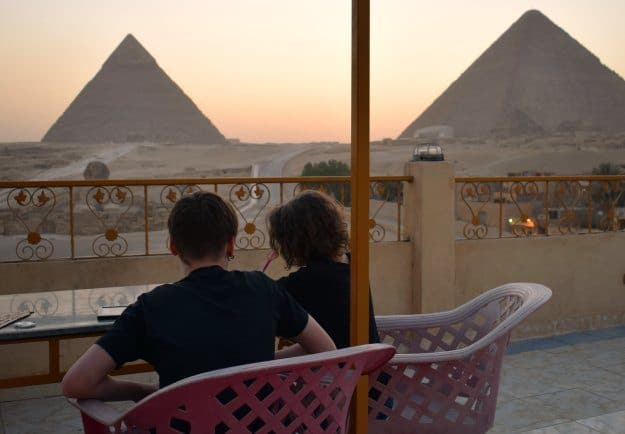
So many kids are fascinated by ancient Egypt and there is much they can learn from books and museums but nothing comes close to taking them to Egypt where their imaginations run riot and there is so much more to learn than Ancient history.
The boys wrote this post on learning about Egypt themselves.
Worldschooling Shakespeare
Stratford-upon-Avon, UK and Shakespeare’s Globe on the south bank of the Thames would be my pick. I got my boys interested in Shakespeare through graphic novels, the classic stories, and words in comic book format. Also look on YouTube for easily accessible video versions.
Worldschooling Great Explorers
I’ve talked about this book before, we loved it and carried it in our backpacks for months. Explore, the Greatest Journeys of all Time. Get Price Here.
As you travel the world you’ll cross the ancient paths of those early explorers time and time again. See where Captain Cook stopped to repair his ship and made his first contact with native Australians in Cooktown, Queensland. Vasco da Gama keeps popping up just about everywhere, we recently found his grave in Cochin, India.
This post is getting too long, I’ll stop with the examples, but here’s a question people ask, how do you worldschool maths and english?
Worldschooling Maths, and English
Young children DO learn a lot of maths and even to read, naturally. I’ve seen it happen in my younger son, he was never “taught” to read and he adores his books now.
They have both picked up almost all of their grammar and spelling from their reading, there is absolutely no need for memorisation of lists.
My feeling is that they do, sometimes, need to write, numbers and letters, and that’s not something my two would ever do naturally when they were younger.
Maybe it comes with age, but at 12 I’m still not seeing signs of him picking up a pen for pleasure. He taught himself to type using an online program, but writing, no.
Lots of boys hate writing, it’s common. I was talking to a schools psychologist about this just yesterday, she said so many boys feel tortured by what they’re forced to do in school and that this torture starts way too young.
With this in mind, we do complete a few workbooks. We’ve always got a minimum of maths and English books in our packs on all but the shortest trips and from time to time we’ve carried Spanish, Handwriting, Coding and Science, too.
You can buy them in good book shops or online and we do them if we have some quiet time. It’s important to do a little fairly often because they do regress if they escape writing for months.
Some worldscholers will suggest keeping a travel journal, well my two would rather have their teeth extracted than be forced to write like that, I’ve found that workbooks work far, far better for my kids.
I have mentioned the workbooks we use (after much trial and error) in our homeschooling and travelling post. For now, I’ll just highly recommend the Carol Vorderman series,
- Maths Made Easy
- English Made Easy
- Science Made Easy
- Computer Coding Made Easy
We also use and have used online learning programmes such as Studyladder, Khan Academy, Minecraft Homeschool, and Reading Eggs.
Reading Eggs is an online literacy tool for kids age 2 to 13 years. It was great for us and they use it in schools. We can offer you a free trial of Reading Eggs, it’s available in UK, Australian, and US versions and isn’t just for little ones learning to read, it supports language skills right up to age 13. Both my boys used it and it was a sound investment.
If we feel we need help from somebody with particular skills, we can find tutors or volunteers. Tutors take some weight off home educators’ shoulders.
Can Homeschooled or Worldschooled Kids Go to College?
Of course worldschooled kids can go to college or university. Statistics show that generally, academic outcomes are better for homeschooled kids than for those in the public school system. If the kids later decide to take exams, they can.
(In the above study, unschooled kids did worse than public school tests. That is to be expected, unschooling families aren’t working towards testing nor following the standard curriculum so the data is irrelevant.)
OK, so they haven’t spent year after year writing essays and solving quadratic equations but it’s a pretty simple process to intensively study for the particular exams they might need in a very short time.
Also remember that exams may not be required as different pathways and entry criteria sometimes exist for homeschooled kids.
Alternatively educated kids seek our further education because they really want it, not because all their friends are off to university so they should be self-motivated enough to get a few exams if they need to. (The UK’s iGCSE system exists, kids can study in a year or so at home, then just turn up for the exams, this is what my boys eventually did, one has now passed with amazing grades.)
My feeling is that my boys won’t want to go to university. I went, I had fun, but in the long run my degree didn’t bring me happiness beyond the gown and cap.
Creating my own job did that for me. I think, I hope, that they will create jobs for themselves too, rather than having to be employed by an organisation.
They have plenty of time to start thinking about that and no pressure to follow the conventional educational course, we will continue to live differently for as long as we can.
If university and conventional employment are what they want, so be it, we can work together towards that outcome.
What Do You Need to Carry to Worldschool?
Really nothing special at all. Some bloggers will write shopping lists for you to boost their affiliate commissions, I’m going to be honest. You need nothing you can’t buy easily anywhere in the world. A notebook and some pencils.
Online learning programmes like those mentioned above have greatly reduced the need to carry books other than for drawing or writing. You really can learn anything from the internet.
Our preference is to carry a few workbooks as above and the boys have their Kindles for reading. Other than that, nothing. Just use what is around you and keep your eyes wide open.
Those how to travel with kids posts I promised you, there are lots more on our site:
- Planning Travelling Around The World
- What Do We Carry in Our Backpacks, Travel Gear
- Did Travel Blogging Fund Our Long Term Travel
- How to Travel Carry on Only
- Problems of Travel With Kids
- How to Find Bargains on Flights Using Skyscanner
Travel by Destination, Just some of the countries we cover:
We cover travel with kids to around 50 different countries on this website, if you use the search button you should find information on worldschooling in, or travel in, most destinations.
For you, for Pinterest, hover and pin.
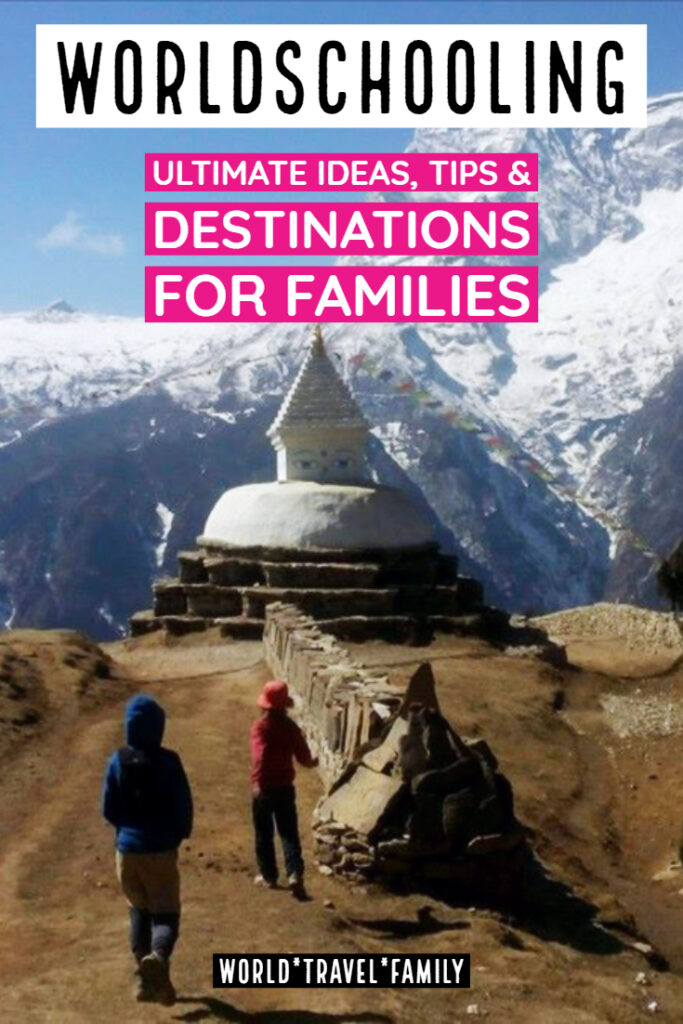
Start Your Worldschooling Curriculum
Take these ideas on worldschooling activities, curriculum, and destinations. Add your own. This is how to start worldschooling, by doing.
This is one of those posts that will grow and grow, I’ll add more detail, more recommendations, more resources, activities, and ideas over time, but now I’m going to hit publish. My perfectionist gene has had this post in draft mode for over a week already.
If you’re interested in this topic and would like more information, tell me in the comments what to add.
Or, do you have any worldschooling tips or ideas you’d like to share here?
I started writing a guide to worldschooling or nomadic homeschooling but what I really wanted to share was an insight into how this works, how the real world has far more to teach than any textbook, and how much understanding kids can develop through real-life experiences rather than being confined in a sterile and artificial classroom. We’ve proved it. Our boys went back to school after being world schooled for years, it went better than I’d even imagined. What do you think?
If you'd like to hire a car during your stay, use this car rental comparison tool to find the best deal!
We also suggest you take a look at this company to get a quote for all kinds of the more tricky adventure or extended travel insurance.
Try Stayz / VRBO for an alternative way to find rentals on homes/apartments/condos in any country!

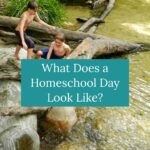
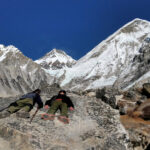
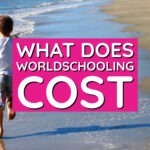
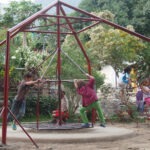
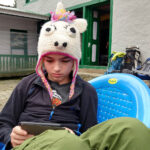
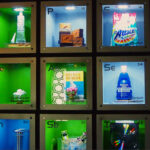
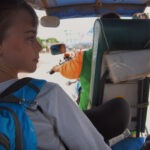
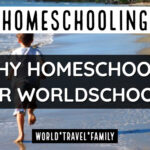
How do you afford to world school? I imagine you guys don’t have jobs since you’re always able to travel. Do you have a post about that part?
Dozens! Look in the top menu, take a look at the tab “blogging”. Alternatively search, there is a search bar at the top of each page, search “money” or “how to afford it”. However, I don’t recommend following our model for financing these days, the industry is much too competitive now. It still provides me with a full time income though.
I am truly convinced that I want to world school my children, but not sure what the best age to start is. Also, not sure if it will be the same experience during Covid times. Your thoughts..??
Do you mean world school, throughout childhood? Or for a short time, a gap year? Will exams be involved? Will you be chasing exam passes and studying your curriculum required for those passes? ( My boys are doing this currently, they’re doing iGCSE courses, you can just turn up and sit the exam, maybe a year or two to memorise the curriculum content) What does worldschooling look like to you? You start at birth with raising and nurturing your kids. School starts between 4 and 7 depending on where you’re from, but really, outside school, knowledge and learning are seamless. They flow, it’s just a natural progression. They won’t learn much that would be considered academic until they are tweens and teens but they will have had a really nice childhood, staying close to their main comfort, love, and support providers, with no timetables, pressure, stress etc. Also interesting, diverse environments to explore are obviously beneficial. Right now, Covid has messed everything up. But I’ve had relatives vaccinated already, it won’t be long before we can all get back to worldschooling. Fingers crossed!
…As for Covid vaccines, I will be sometime in 2021, but they haven’t even started the trials for children vaccines yet. That said, there are countries you do not need a vaccine to enter. I’m just not sure about health coverage right now….
Hi Michelle, I cut your comment down because it would destroy my SEO, but I read it. You seem very focused on your children’s academic success. Would you be able to let them no longer follow a set curriculum, grade levels, not “learn” in any conventional structured way? Will you be able to “deschool” yourself fast? It can be hard to trust in natural learning when you’re used to the school way. I’m not thinking about vaccine requirements at all, just open borders. There are very few currently. Asia is pretty much locked up tight. Travelling in most of Europe wouldn’t be smart until the vaccines roll out. Central and South America seem to be easiest. Along with eastern Europe, the Balkans, Maldives, some of The Caribbean. I have friends who’ve been stuck in Vietnam all year. Unable to move on. Being stuck like that isn’t the experience they wanted. I’m presuming you’re American. Australia (where I am) is shut. We can’t get in or out. Are you thinking of dropping everything and going right now? Most people spend a year or so getting everything organised. Because things will change big time in coming months – we all hope. I wouldn’t encourage anyone to go now when a much safer and more enjoyable experience is just around the corner. I’d start by pulling your kids out of school and see how life looks with them with you 24/7 at home. I’ll be travelling just as soon as I can, and I hope that will be by the middle of this year. There’s not much money in writing about worldschooling, I’m holding most of the Google number one spots and the search volume is tiny compared to the terms that really put food on the table for us. Also with the current situation, travel interest is way, way down, but since November it’s bouncing back. Confidence is returning. My business, income, and life are all travel. I would travel right now if I could, yes. But I can’t, not least because we don’t have that travel funded by our travel business. The industry is on its knees. I can’t really help you make your choice, only tell you what I know, through worldschooling and travelling for the last 7 years, because every family is different, different kids, different dynamics, different ideas of what travel style is for them, different wants, different needs. Feel free to e-mail me if you’d like to chat more.
I love your post. I have a 4 and 5 year old and we already unschool. My husband has an IT job that could theoretically be done anywhere as long as he has good internet. I am really keen to worldschool. But not for more than two- three months in the year (I need the NHS!). How do people find affordable accommodation for short periods of time. Look forward to hearing back!
We use hotels Mona. A hotel ( guest house is just a different name) should be between $12 – $50 per night. I say 12 because that’s the lowest we ever paid. 50 is about the max most long term travellers want to pay. There are exceptions, if you’re in a big city like New York or London you may have to pay more. The trick is to spend more time in the cheap places, less in the expensive places. We’ve basically lived in hotels for the last 7 years. It’s fantastic. If you’re only travelling short term though, you have a problem, you will be paying your at home costs ( mortgage or rent and utilities) as well as your travel costs. Then it becomes expensive. Most of us eliminate at home costs. We had our house rented out. I doubt you’ll be able to pull that off for short trips but maybe you could through Airbnb.
To anyone out there who is listening , don’t doubt yourselves about homeschooling or world schooling as you begin this adventure if you are truly excited and dedicated about doing it. If you are organized and resourceful , it’s going to be an awesome experience! I will not promise there won’t be some bumps in the road. Sometimes you will have hard days and thoughts of “oh my goodness what did I do?!” But it’s such a great thing if your child has ever been bullied, is gifted, has social anxiety or simply just thirsts for more. In addition if you are a teacher like me and you are fed up with the school system and all of the horrors that go on there I strongly recommend doing this. Nothing is more fulfilling than homeschooling when you connect with events as well and classes as
You travel and believe
Me THERE ARE SO MANY! Wait until you see the amount of material you can cover and how fast
You speed along as compared to what they do in the public school system by the way. Real life experiences and one on one learning is priceless especially when it is a family doing it together in a loving nurturing environment. You WILL find others to socialize with! Register for those art classes that are age appropriate for two weeks or more as you travel . While you are in a particular city, sign up for music lessons, dance, writing workshops, library sessions, nature walks, etc that all intertwines with your curriculum as you move along and your children will interact with other students at your leisure as much or as little as you choose. There are many homeschool and unschool sites that give
You access to events and classes that you can register for many are free or low cost! Best of luck! We all support you!! The most important thing is to believe in yourself and your child will follow suit. That’s what this journey is all about . Something the public school system is seriously lacking these days. Just remember don’t ever let anyone ever make you feel like you’re doing the wrong thing. No one should steal your light, let it shine!!! My daughter immediately flew through 6th grade curriculum ,7th and 8th in a year and a half with me schooling her. I also incorporated travel as well as outside experiences. I couldn’t be more in awe of the outstanding individual she evolves into more and more each day!
Glad to hear it. Most of my alternative education friends are teachers at very minimum, more highly educated often. All have degrees and did conventionally “well” but the number of teachers who refuse to put their own kids in the system is quite staggering.
@Nicole Maciura, I am seriously doubting whether or not it’s the right decision for us, simply because I am the sole parent and not sure how I would be able to work with my kids at home. I could essentially work from anywhere as long as I have a good internet connection. That said, I’m a bit spoiled with my iMac and can’t stand laptops anymore, lol.
What age is good to start world schooling? I have four kids: boys are 4 & 6, and girls are 2.
That’s too young for academic benefit, obviously. But it depends what you want them to get out of it. Homeschooling can be a birth to adulthood thing, but if you’re thinking in terms of sitting exams, that comes later. What they learn when they’re small has no bearing on exam success later. ( I have the proof of that here with my two) Unless you keep them illiterate and in a box, obviously, and I don’t think many parents do that.
Hi. Thank you for sharing so much about your experience worldschooling your children. I wonder how is this is something you could do because they are two and very close in ages. We travel extensively with our daughter but she really needs social interactions with other children. The Forest school sounds like the best alternative for us.
I don’t know Kelly. Has your daughter been in the school system at all ? If so it often seems to mess them up. If not it seems to work out fine based on the hundreds of emails / comments we get. If they think school is normal and good…you have a hard task. Otherwise kids don’t seem to expect that sort of social interraction every day.
Love all of this. I’m a teacher and really interested in alternative ways of teaching. Like a lot of parents, I guess, I just don’t feel the traditional UK classroom model works for everyone. Great to see someone making a real go of doing it differently.
I think Emmydee, that there is a lot of fear and a lack of confidence. People don’t think they can do it. They see educating their own children as beyond them. I’m in a position to be able to work from my laptop, to be able to be with the kids full time and be able to travel ( which is actually a lot cheaper than staying home ). I just wish more people believed in themselves, trusted in their kids to learn and knew that alternative ways existed. So I just keep on blogging… Thanks for stopping by! How did you find us?
I was actually googling for recommendations on travel gear! (Good rec’s, by the way, will be buying the cable holder!) One of my concerns has always been the socialising element of taking your kids out of school and moving around. You make a really good point that no one ever asks adults that. I’d not thought of it like that before. I do agree though that parents should have more faith in themselves and their children, and I think it’s great that your blog is encouraging that.
There are far more people out in the real world than in a classroom Emmydee ! It’s honestly never been an issue, my two are very self contained and just happy. Also, the little one would spend all day chattering to his friends online if I let him. Social interraction is possible in many ways now and it’s been amazing to watch his online persona, social skills, diplomacy and confidence grow right here in my kitchen. ( or our farm kitchen in Romania) Also I find being around people all day really annoying, I need space and quiet to do the things that interest me. I would imagine there are plenty of other people and kids like me, I’m pretty normal. Anyway, the big boy and I are off to Borneo next week, work, with grown ups, that’s going to be an interesting social experience for him, diving into the workplace at 14. It’s all good, it’s all different. He’s really excited. Thanks again!
Hi there. Really appreciate your article. I have a 13yr & soon to be 12yr boys. My youngest was diagnosed with autism before his 3 birthday. Their both honor students in middle school 6 grade & 7th. At his IEP they have encouraged regular for next year going into 7th grade. I’ve thinking a lot of world schooling. Very excited & scared in regards to their education. We live in California & the LAUSD has me feed up. In one word “they suck.
My concern is funds to travel. How can some plain Jane afford to travel with 2 boys.
I got travel a lot when I was a child because of my wonderful grand parents.
A desperate mom. Just want them to have the best! LAUSD is not the best option.
Sincerly
Blanca
Hey Bianca. Well we saved up for our first year, $30,000. It lasted 1 year. After that I’ve worked stupidly hard to get the websites where they are today. Some people sell their houses, we rent ours out, but the profit on that is tiny. Most sell all of their possessions and find they never miss them. We raised several thousand that way. Some find jobs they can do remotely. Go to our money category, top left, drop down menu, I think it’s called Money or Money to Travel, Blogging is in there too, but don’t think a blog is a quick income provider, it’s easy if you know how but you’ll need to put in a LOT of hours.
Hi Blanca, We have been able to worldschool by saving money and living off of that. We also rent out our apartment and live a minimalist lifestyle. I think if you make worldschooling your priority, you will find a way to finance it. Good luck! X, Nino
Hiya, I really want to join the world of world schooling and travel the world with my 9 year old daughter but one question I would love you all to answer is how do you survive financially? Is there a way to work with your children in all the places you travel other are you just rich or saved loads before leaving? Any ideas on how to make an income while travelling that doesn’t including having to have a degree are most welcome. Thanks ????
I support our family through blogging Melissa, you’ll find lots on that in our blogging section. But it does take a huge amount of dedication and hard work.
Thanks so much for your reply. I will check out your blogging section now. I’m not very computer savvy so hopefully you show how to start a blog page. Maybe this will be the way towards being able to afford the dream of travelling with my child????????
Alyson, Thank you so much for your article. We have been traveling for 3 months and intend to travel the world for several years full-time. Our boys are 9 & 10 and coming from a Montessori School program, we have been trying to figure out the best way to continue their education. I go back and forth about whether they should be learning the same type of math, science and language lessons as their peers or just let them learn through experience. We have been using the Khan Academy program but it is quite limited. I am going to look into the others you suggest. We are finding that they miss their friends. How do you find ways to connect with other kids locally? We move from place to place every 1-2 weeks so its been more difficult. Not many families travel this way so was really refreshing to read your article.
Kindly, DayNa
Up until now we’ve had no worries with them finding other kids to hang out with. But now, they’re not kids any more, we can’t just take them to a playground and watch them mingle. It certainly gets harder as they get older. My teen swears he doesn’t need anyone, my tween is missing his friend from Chiang Mai last year. They Skype. They’re both happy, very happy, but it would be nice if people just TALKED TO EACH OTHER MORE. We’ve been sat in a restaurant tonight, you could tell that everyone needed to connect, to talk, but they don’t. I think we need to start a revolution .
Thank you for sharing such useful information! We are part-time travelers and have just (like today) made the official decision to world school our children. It’s so wonderful knowing their are families providing this type of education and lifestyle to their children all over the world and that we will have a community to share our experiences with. Your family is truly an inspiration and we are so thankful that you are willing to share your knowledge with us!
Thank You Stefanie, good luck and enjoy your adventure.
Excellent. This was so thorough and helpful, I appreciate your honest posts so much.
I LOVED it! Very helpful! I’ve been homeschooling my kids for the last 4 years. We’re mostly unschoolers, but we do a few tasks here and there because I feel the need for it (my need to see them doing something ‘useful’, really). Now we’re on the road, I carry paper, pencils and we use the internet a lot for ideas.
I love the idea of taking the subjects and putting them clearly. I might try that too to show the concerned family that they do learn.